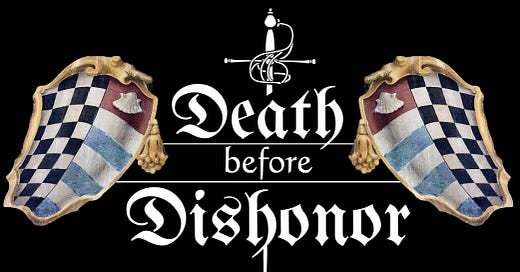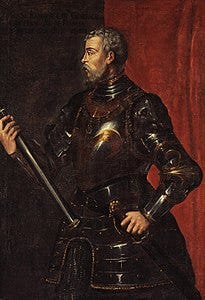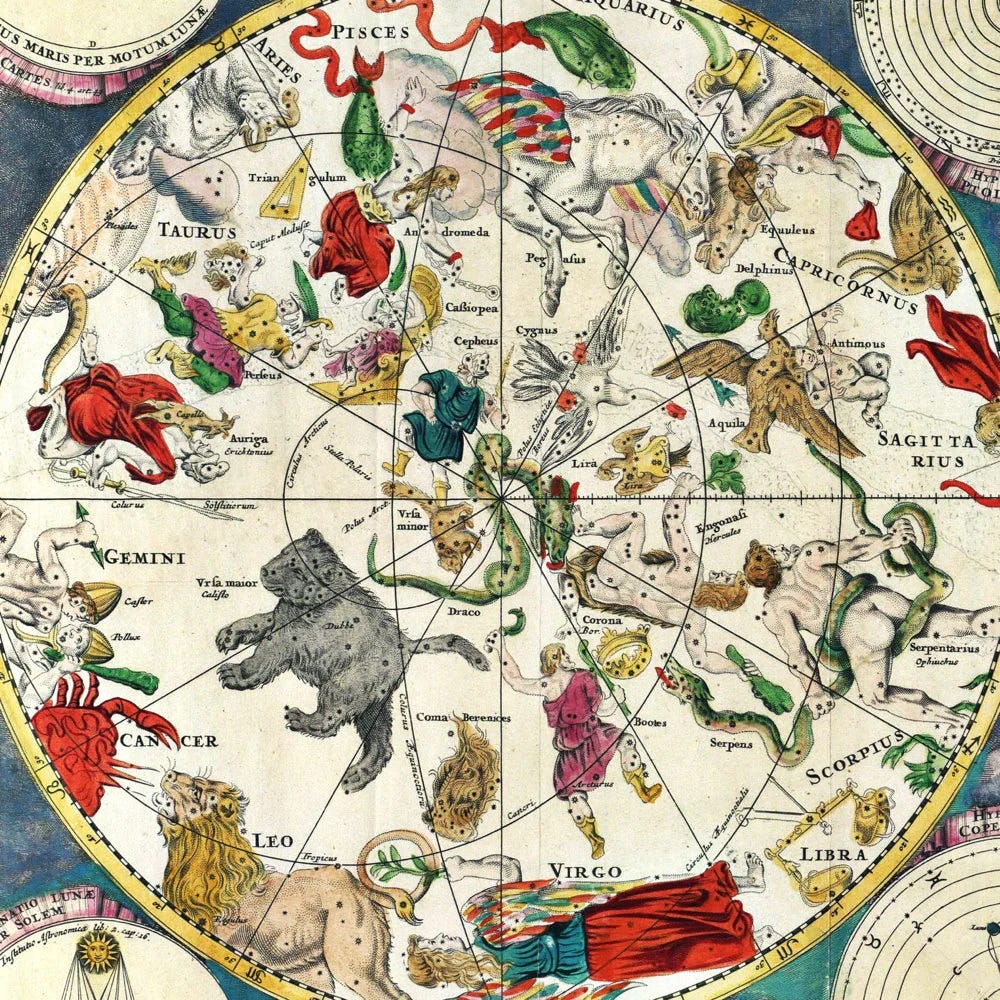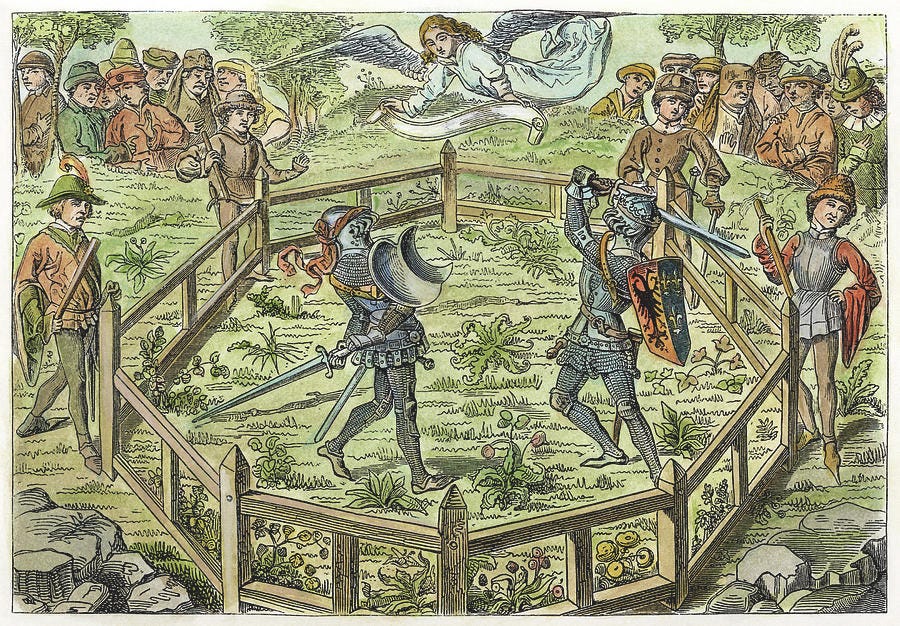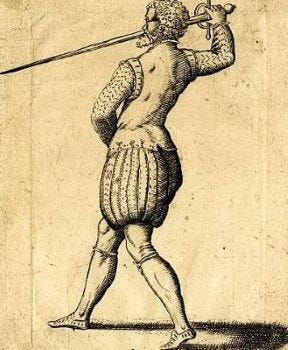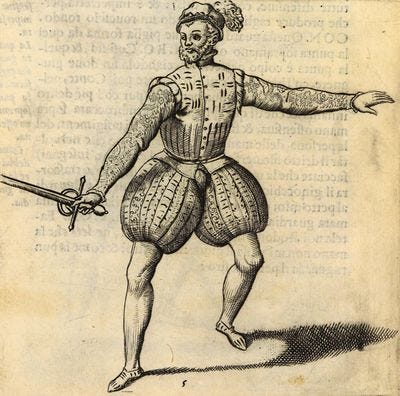It was a time of superstition and science, a time when necromancers rubbed shoulders with astronomers, when knights in shining armor charged at cannons belching flame. It was the time of Macchiavelli, the time when Leonardo da Vinci and Michaelangelo created their masterpieces, and a time when swordsmen learned to use their weapons with as fine a skill as a seasoned sculptor.
On New Years Eve 1516 two of these master swordsmen met for a legendary duel.
The challenger was Count Hugo Pepoli, a captain in the service of France.[1] He would be fighting a captain in the Army of the Pope, the famous Count Guido Rangoni.[2] Both men were from Bologna, a city renowned for its university and its skilled swordsmen.[3] They were second cousins.[4] Hugo and Guido were both known to be courageous and they both hated each other; in short it promised to be one hell of a fight.
On the morning of the duel, a large crowd gathered outside Gonzaga Castle near Mantua in the heart of Northern Italy. Here the Marquis of Mantua had prepared a large dueling ground, four spear tosses long on each side.[5] In keeping with the custom of Italian dueling, there was a raised platform for the judge and his counselors.[6] Here the judges of the fight would make sure that the rules of the duel were followed, rules that guaranteed there was no trickery, and that “the duel should test the strength not of the body but of the soul.”[7]
The dueling ground was surrounded by a long wooden fence that would separate fighters from the crowd. In each corner of the dueling ground stood a “snow-white tent striped with imperial purple.” Over one flew the banner of House Pepoli, a silver and black checkerboard pattern that recounted their origins as moneychangers (the checkerboard being an old device for tracking the value of different currencies.) From the other other corner flew a banner with silver shell on a red sash atop a field of blue and white stripes of the House Rangoni, a military family that had served as condottieri or mercenaries for generations.


Guido Rangoni could count upon many supporters in the crowd. He was related by marriage to the Marquis of Mantua.[8] More supporters came from throughout Northern Italy, but perhaps none so fervently were praying for Guido Rangoni like the rich Venetian nobles in their fur hats and long-sleeved robes, with rings on their fingers and belts adorned with gold.[9] Although Guido was no longer in Venetian service, he had served Venice faithfully when the Republic stood in the valley of the shadow of death and thence led it to the light of survival.
Hugo Pepoli had his own supporters: not just his own friends and family, but French lords and and ladies came to watch and support him, as Hugo had served the King bravely and faithfully in the most recent war.[10] He was a man who was or soon would be, “the greatest Italian in the eyes of the King of France.”[11]
Naturally some of the French nobles sought out supporters of Guido Rangoni for some friendly gambling.[12] Hugo’s fans were sure that one overhead thrust from the mighty Pepoli would skewer his short opponent like a thrush.[13] They would have found plenty of takers, especially among the wealthy Venetians in the crowd. In the past Guido had helped to save Venice in its darkest days by fighting forces many times larger than his own.[14] The rich and arrogant Venetians were sure that the tenacious “Little Guido” would do the same thing today.
Suddenly, the piercing cry of two long trumpets rang out around the dueling ground and commanded the crowd to silence. The duelists were approaching.
For a moment the only sound was the snap of flags in the swirling wind. Then the crowd heard the gentle thump of walking horses, growing steadily closer. The lords and ladies craned their necks to see the bold warriors.
The men did not disappoint.
The challenger of this duel, Hugo Pepoli appeared first. He wore a purple cloak, trimmed with gold. He was a “tall man,” with, “excellent proportions.”[15] His doublet revealed wide and powerful shoulders, while his tight-fitting hose showed muscular thighs. Long curls descended from his head. Upon his crown stood a net of golden thread to keep the hair out of his eyes. He rode a large, powerful-looking war horse, a muscular stallion with hindquarters like chiseled blocks of granite. Though his horse was not wearing its barding armor today, Hugo still wore the long spurs of a knight, with the stirrup leather above his knee.[16] He rode rigid and erect in the saddle, almost like he was getting ready to break a line of infantry or drive a lance through his enemy’s visor. Around him rode many other fine nobles and the whole group was followed by servants in the black-and silver livery of House Pepoli; with golden swords gleaming at their sides.[17]
Guido Rangoni was just half a minute behind him. He too wore a purple and gold cloak. He had close-cropped hair and a small beard, and preferred simple clothing, letting his reputation speak for itself. He chose a smaller horse, but a destrier with real attitude. As he approached, his horse, sensing the eyes of all upon his master, “neighed and pawed at the ground kicking up dust.”[18] Guido sat this horse with the easy touch and silky grace of a man who eats and sleeps in the saddle. If Hugo had made his name as a fine-looking and valiant knight, Guido was known for his surprise raids, where the key was to keep riding for hours or even days. He too was surrounded by friendly nobles, and was followed by servants and pages in the blue and red livery of his house.[19] Guido was a superstitious man.[20] He had been sure to consult with astrologers and now moved with the confidence of a man whose planets forteld success.[21]
As he reached the dueling ground he brought his horse to a stop with a gently whispered word. Guido slid down and entered the dueling ground where the powerful Pepoli was already waiting. Nothing in Rangoni’s stride demonstrated the least fear of his larger opponent.
A fresh round of speculation broke the silence. New bets were placed as the odds shifted toward Pepoli. In combat, size matters.[22]
Both men presented themselves to the judge on his wooden platform above the dueling ground. The judge rapped his staff on the platform for silence. He solemnly called upon Pepoli and Rangoni to be good Christians and forgive one another. A soft laughter rippled through the crowd. The Judge’s words and grave demeanor were just theater. There was no way these men were not going to fight. Guido Rangoni and Hugo Pepoli played their part in the little farce. They angrily refused the Judge’s request. They had been trying to fight this duel for three years and now they had their day. There would be blood.
Now came time for the weapons. Guido said, “Hugo there is no further point in speaking, only deeds matter here. Since it is my privilege to choose the weapons, here they are.”[23]
Guido Rangoni’s second came forward with the arms.[24] Each man would have a sword for his right hand and for their shields, on their left hand would go a bronze gauntlet with “coverings linked in a handy scale-like bronze binding and a lamina well-woven to the fingers and palms.”[25]
Rangoni declared that they would fight with no other protection.
A gasp of surprise hissed from the crowd.
Hugo’s second as well as the judge inspected the arms carefully. Once it was determined that the weapons were free of defect and since there were no enchantments on either the sword or the gauntlet the judge gave his approval.[26]
“And the duel. Will it be fought to first blood?” The judge asked.
Rangoni stated the duel will be fought to completion—to the death.
Excitement buzzed through the crowd. Who had ever heard of such a duel taking place? Many here have worn the blood of their fallen enemies upon their clothes. But a duel to the death without armor? It was reckless. Some were impressed at the very nerve of such a fight, Others held that fighting without armor gave the surest proof of the true virtue of the two fighters, since many believed that using defensive weapons showed a lack of nerve.[27] Others deplored the sight of military men fencing in their shirts, contrary to the practice of war.[28]
Once Rangoni and Pepoli retired to their tents to dress for the fight, the judge rapped his staff loudly once more upon the platform. He made a solemn declaration to the crowd. “When the duel begins, you must remain silent. Upon the pain of death, none of you may cry out when a wound is given or received.”[29]
Guido Rangoni was the first to emerge from his tent. In his right hand he bore a sword. A bronze gauntlet covered his left arm. His supporters cheered as he took his place before the judge. The French and their cronies from Milan made further insults about his short stature.
A few minutes later, to the cheers of his own supporters, Hugo Pepoli emerged from his tent. He was dressed almost identically to Rangoni, save for one crucial difference. To keep his long, flowing hair in a bunch, Pepoli had kept the net of golden thread upon the crown of his head.
Rangoni objected to this net.[30] “We are to fight a battle and he comes dressed as though to please a lover. Tell Pepoli to cut his hair short like a man, like mine or else tie it up in a knot like a serving girl to keep it from his eyes.”[31]
His friends erupted into laughter at this insult.
Pepoli ripped the net from his head and threw it on the ground. The laughter grew louder as everyone saw the reason for the golden net. While Hugo still had long flowing locks around the ring of his head, he was nearly bald on the pate.[32] His face darkened with repressed rage at the laughter and one look from him was enough to silence anyone.
Without a sound the crowd watched the two men retire to their corners.
For one still, pregnant, electric moment all was silence and nothing was heard but the ever-present snap of the pennants in the winter wind. Then the trumpeter gave one long blast of his instrument that reverberated off the nearby castle, one long note of warning: death is coming.[33]
The two fighters went from languid to taut, as though they were arrows in a bow. Their swords and bodies moving from the positions of ease and rest, to the carefully-practiced and refined postures of the trained swordsman.
At the second blast both fighters assumed their respective guards. Pepoli stood tall and proud, his sword hand high and the point dropping down menacingly, in the guard known in Italy as the guard of the Unicorn. Rangoni remained tight and in profile, his sword before him in the position known as the Iron Gate.[34]
At the third blast of the trumpet, both fencers sprung forward. They moved smoothly, on the catlike feet of skilled fencers, seeking to gain as much ground as possible.
The duel had begun.
The Art of Arms is pleased to present this series on the duel of Guido Rangoni and Hugo Pepoli, two master swordsmen of the Renaissance. When we started this project we thought we would do a little background to understand whose these Bolognese warriors were and then go onto describe the sword fight itself matter of honor? Was it really a matter of political rivalry? Was there an old score to be settled? Or was it just the natural consequence of a rivalry that stretched backhood to their boyhood, back to the fencing halls of Bologna?
But as we investigated the story and their lives it became clear that the duel was a reflection of their culture; these men were warriors and it was impossible to separate this duel from the wars of the time, from the conflicts of family and the individual’s pursuit of his own destiny.
Stay tuned for our next episode: Two Boys in Bologna, where we explore the youths of these two men as they they crossed foils in the fencing halls of Bologna.
See Bibliography for More Details
[1] www.condottieridiventura.it, entry for October 1516.
[2] www.condottieridiventura.it, entry for May 1516.
[3] See Ghiradacci, p.269. In November 1492, when Guido Rangoni was eight, his father established his residence in Bologna in the former house of Pirro Malvezzi so while Guido was Modenese he had grown up in Bologna.
[4] G. Albini, Di un duello fra G. R. ed Ugo Pepoli nella cronaca e nella poesia del tempo, Bologna 1892, p.10. Guido Rangoi was the son of the famous Niccolo Maria Rangoni. Ugo Pepoli was one of twelve children of Guido Pepoli and Isotta Rangone. The two men shared two great-grandfathers (Jacopino Rangoni, d.1413 & AntonGaleazzo Bentivoglio, d.1435).
[5] Bryson, the Sixteenth Century Duel, p.187
[6] Achille Marozzo, Opera Nova or the Duel, ch. 243.
[7] Bryson, p. 50.
[8] His maternal aunt Laura Bentivoglio was married to Giovanni the youngest brother of the Marquis.
[9] Comments on fashion from Sanuto. “..everyone is wearing fur, whereas in his (the Doge’s) time, people wore simple clothing from the waist up, and now everyone wears the Doge's robes, which used to be worn only by the Doge and a few in this land.” Sanuto, col. 497. See also the prohibitions on priests on cols. 77-78.
[10] Dalle Tuate, “…tutti li Francesi che erano in Lombarida per lo conte de’ Pepuli.”
[11] Viggiani, Lo Schermo di Angelo Viggiani. p.78
[12] This is suppositional – it’s hard to imagine that there was not some gambling going between the partisans of both sides.
[13] According to the fencing master Angelo Viggiani, Hugo Pepoli’s preferred guard was the Unicorn. This is a stance where the hand is at the height of the ear or higher with the point facing downwards at the opponent’s chest. This is a guard that Viggiani says is for fencers “of great stature.” As to the stature there are many references to Guido’s small size, but perhaps none so good as that of Angelo Viggiani who fulsomely describes Guido as, “Count Guido, a perfect man, short in stature but tall in nobility.” Viggiani, p.73
[14] Probably most notably when he attacked a group of eight thousand German landsknechts with only two hundred or so mounted crossbowmen under his command in October of 1509. Sanuto, XI, col.227.
[15] Viggiani, p.78.
[16] See Grisoni p. 12. “This style of riding with the stirrup leather above the knee was historically more common for knights, who often used heavily armored horses. At that time, longer spurs, approximately a palm in length, were necessary to reach the sides of such heavily built horses, requiring adjustments in posture to accommodate the armor.”
[17] Modesti. “The servants stand around the masters in thick dual ranks, their legs and backs painted with striped threads, all girdled with golden swords”
[18] Modesti.
[19] Among those following Rangoni was probably a fourteen year old Sebastiano Fausto da Longiano who states that he started his service in the house of Guido Rangoni, Duello di Fausto di Longinao, see dedication; according to Bryson Fausto also described elements of this duel.
[20] He once abandoned Modena because a flood was foretold and became the subject of some ridiciule as a result.
[21] For more on astrology and duelling see Marozzo, ch. 195. According to Giuntini, p. 299, Guido was born on April 12th, 1485 at 11:44 in the evening.
[22] Obviously this is a contentious issue. But as a general rule, sources confirm that height confers reach, which gives a fencer the ability to strike first while size confers an advantage in wrestling.
[23] “From Intervidum Rangonum Et Ugonem Pepulum Duellum” in Ad Antonium Grimanum Venetias, by Publius Modestus. Note that the Latin translations are electronic and thus prone to error.
[24] Note that the term “second” is used loosely here. In the duel Guido would have been accompanied by a padrino, an older and experienced fighter.
[25] Modesti
[26] See Art of Arms, “The Savage Within: Historical Sources.”
[27] See the History of Florence, Benedetto Varchi, pp.
[28] See Bryson, p. 46.
[29] As described in Bryson. Words to this effect seem to have been a pro-forma announcement in other duels of the time, for example in the duel of Guasco and Doria described in “The Savage Within,” on the Art of Arms.
[30] Bryson, p.189.
[31] Modestus. Note the serving girl comment is added for color and does not appear in the original.
[32] Per Bryson, Bianchetti remarks that the true purpose of the net is to cover Hugo’s bald spot. Bryson, p.189. As Bianchetti is only available in Bologna I cannot confirm this statement.
[33] See Monomachia, Francesco Altoni translation by Stephen Fratus, pp. 136 to 141 for use of the trumpets in a duel and movements just prior to the beginning of a fight.
[34] According to Viggiani this was the preferred stance or guard for Guido Rangoni when fighting with the sword alone.

